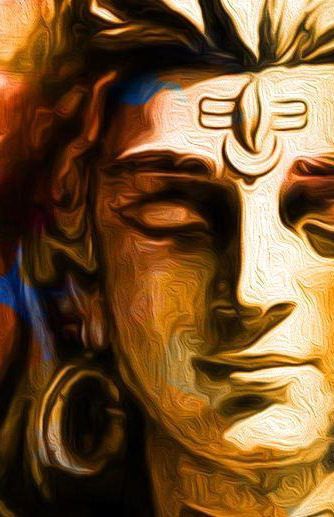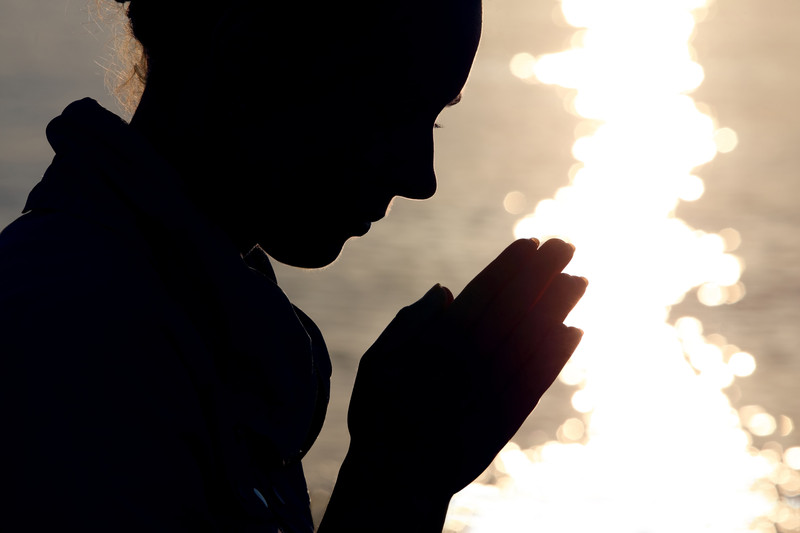1.- Interpretation of the Niyama Isvara Pranidhana
In most interpretations of the Niyama Isvara Pranidhana, we are advised to ‘surrender’ to this Consciousness or Higher Self.In essence it means cultivating a deep and trusting relationship with the Universe and making every action an offering to something greater than ourselves. It means worship of Îshvara (the Lord) with an attitude of surrender, abandonment in Him through ritual.
2.- Surrender to the Lord
2.1.- Etymology and definition of Niyama Isvara Pranidhana
The term Isvara Pranidhana is made up of two words; Isvara, which translates as ‘Supreme Being’, ‘God’, ‘Brahman’ or ‘True Self’ and Pranidhana, which means ‘fixation’.
“God” is a complicated word to interpret; there are many people who even find it uncomfortable to discuss the concept of one God (or, as in the Hindu tradition, many Gods). The yoga does not impose the idea of God or a religious structure to anyone, but as you may have noticed by listening to what your yoga teacher may express to you, there is an underlying idea that there is something bigger, deeper and purer, which is above ourselves. Surrender to the Lord through Isvara Pranidhana has two meanings: on the one hand, it is an internal attitude that must encourage all action, a veneration towards a superior intelligence.

And on the other, concrete practices that involve all the dimensions of the human being and that end up being a renunciation of the ego, a decision of self-surrender with full freedom. Surrender and obedience to the Master. Accept his teachings as instructions.
Use the Organic Rosemary Incense if you want to give up the ego and give yourself with total freedom.
2.2.- The path of disidentification
The Niyama Isvara Pranidhana tells us about offering or prayer. This concept forces us to ground any mystique and make it flesh. Everything you have conquered is not yours, and it is not yours because the firmness of an individual identification has been crumbling for a long time. The goods are not yours because the idea of possession is not supported by careful observation. It is here that the small will bows before the great will, the small face is reflected in the large, microcosm fitting into the macrocosm. And that opening must be understood as an inspiration before the divine.

Offering the fruits of our actions at the feet of the Lord is the path to disidentification that brings us so much suffering, and a path to humility. Being in the world but knowing that our roots are not below but above, with the confidence that everything will be given. The borders open because there is no longer a little me battling with others for a slice of greater prestige, now there is a “You” and this immense you includes everything: my suffering and yours, my life and yours, the life of generations to come, and also includes respect for the ancestors.

Cultivate a deep and trusting relationship with the universe and make every action an offering
So, our action is done from a very deep meditation that includes the first Yama, which is not violence, and is sublimated step by step until this last Niyama, which is the maximum expression of an ethic, which opens the doors of a spirituality. deep.
3.- Apply the practice of Niyama Isvara Pranidhana to life
3.1.- How to flow with this new path
There are two ways to consider the Niyama Isvara Pranidhana when brought to daily life;It is often described as the ‘easiest’ path to peace and fulfillment, which requires no effort or pain on our part: we just let it go, we hand it all over to a Superior Power and we completely dedicate our actions to what we intuit that this Superior Power is…

But, is this the most difficult path to follow? we are so inclined to control our every action and its results that “letting go” is not always easy. If you are the type of person who needs that feeling of ‘control’ in life and is in constant battle with one’s own mind, then Ishvara Pranidhana is probably the most difficult of the Pranidhana’s to follow. Yamas and Niyamas. As we have mentioned, it is not a God sitting on a pedestal that we surrender to; it is a reality, and reality can be quite frightening at times.
3.2- The Niyama Isvara Pranidhana in your daily life
In our daily life, the Niyama Isvara Pranishana it can be seen less as a devotional dedication or surrender, and more as an opening to what is; and instead of fighting life’s twists and turns, staying open to experiencing life as it unfolds.
We remain fixed and rigid in our patterns, as the habits we have been conditioned to lead only to a limited life. Surrender is a great challenge, because it means transcending the ego, and the ego will do its best to cling to some control. Without this conditioning, the worries, the perceptions, and the judgments, the ego would cease to exist. Therefore, it desperately tries to hold on when we work to calm it down.
Surrendering requires trust in our Superior Consciousness, our intuition and the courage to express who we are, as we are, with all our virtues and imperfections, which ultimately leads us to freedom.

4.- How to apply the practice of Niyama Isvara Pranidhana to your life
Whether giving ourselves up to a moment of difficulty or a momento of joy without expectation, delivering the results of our actions to our Superior Consciousness, or simply learning to trust the Universe a little more; every time we choose to deliver something, we get a little closer to this new concept of freedom.
